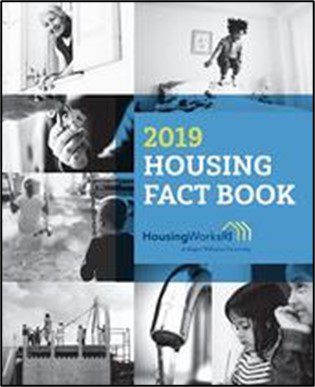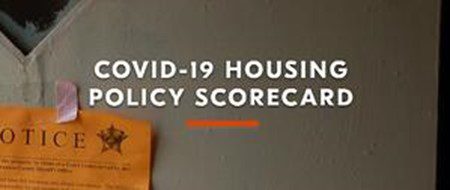by Franny Zhang, Content Lead
June 29, 2020
On the morning of Wednesday, May 13th, MLPB convened a (BYO) Breakfast on the topic of Old or New, “Normal” Hasn’t Cut It: Innovative Strategies to Promote Housing Stability Among Families with Young Children. In recent months, the COVID-19 pandemic has expanded awareness of the profound inequities that exist in the US, including the struggle for families to access safe and stable housing. MLPB recognizes that a deeply-rooted problem of this size requires an equally broad and multisector solution. As such, we convened thought leaders specializing in family housing stability innovations at the household, systems, and policy level, based on a version of Thomas Frieden’s Impact Pyramid, that was adapted and featured in a Sep. 2019 brief authored by Samantha Morton of MLPB with Stephanie Doyle of The Center for the Study of Social Policy (CSSP). The panelists provided a blueprint to over 100 participants, representing health administration, social work, community health workers, community organizers and more, of how to work together in new ways to promote stable housing for families.
At the household level of impact, moderator Baraka Floyd of Stanford School of Medicine & MLPB guided a conversation between panelists Allison Bovell-Ammon, Director of Policy Strategy, Children’s HealthWatch at BMC and MLPB’s own Legal Director JoHanna Flacks. Allison and JoHanna spoke primarily about their work with Housing Prescriptions as Health Care, a research study funded by The Boston Foundation. In this randomized controlled trial, families with complex medical needs were divided among two groups:
- The experimental “Housing Prescriptions” group received what Allison termed a “wrap-around set of services,” in the form of care that integrated legal problem-solving insight from MLPB as well as case management and financial counseling provided by partners represented in the photo to the right.
- The control “Resource List” group received the current standard of care in the form of informational lists.
Initial findings from this study were recently published in Health Affairs and include comparative data on improvements in parent/caregiver mental health and child health scores. Allison noted that, “at six months, the majority of families in the intervention had not moved into a form of stable housing…but what we saw and what parents reported qualitatively was that having someone on their team, having someone walk through this process with them, to hear their concerns really made a difference…the problems seemed now solvable.” Housing Prescriptions adds to the body of evidence supporting a more holistic approach to health and the crucial role an interdisciplinary care team can play in accelerating measurable gains in a family’s well-being.
In the second panel focused on system-level impact, moderator Jeannine Casselman, Legal Advisor at MLPB, spoke first with Brenda Clement, Director of HousingWorks RI at Roger Williams University. Brenda described HWRI’s efforts to bring together programs and resources — including government, healthcare, private and public housing systems — to improve systems intended to promote housing access for families. She acknowledged that the great complexities of these systems can be a barrier to those navigating them. Brenda also highlighted the Housing Fact Book that HWRI publishes every year to track housing affordability in RI. This valuable resource is curated by HWRI and its partners and is a living example of how different institutions can unite to create comprehensive resources that further housing stability by demystifying a complex landscape that impacts so many families.
Housing-related data also was at the center of Jeannine’s discussion with Soojin Conover, Senior Data Analyst, and Yusuf Ali, Network Coordinator, both of Vital Village Network at BMC. Both panelists spoke of their work on Vital Village’s Community Housing Data Tool. This tool is designed provide data maps so that Boston families can access data maps to inform their housing stability and safety choices. According to Soojin, “by linking health and housing data in the Boston area, this tool shares relevant data maps with Boston families.” For example, if a family is looking for housing in Boston, they can search for data such as needle pickup requests, crime density, and blood lead levels to help them determine the safety of the neighborhood. The tool was created in response to feedback from VV’s community, and VV also leveraged relationships across their network to access data such as the lived experiences of single dads and returning citizens to ensure data integrity and usefulness. In addition, MLPB shared a framework with VV to transform the data from random points to categorized points along a continuum of legal, health, and housing needs. The Community Housing Data Tool emphasizes how data sets are a powerful network that has great potential for community-driven systems change.
MLPB’s CEO, Samantha Morton, moderated the third and final panel focusing on policy-level impact. Salin Geevarghese, President & CEO of SGG Insight, LLC and Senior Fellow at CSSP was up first and reflected on his experience as a leader in the Obama administration’s 2015 effort to strengthen the affirmatively furthering fair housing (AFFH) requirements of the 1968 Fair Housing Act. Salin’s account highlighted how individual and structural racism continues to pervade housing policy in the U.S., and he reported that during the public comment period for the proposed new AFFH rule, “three quarters of the [public] comments were pure racist screed.” He also reinforced “the big caveat that we all have to wrestle through is that knowing doesn’t substitute for political will when we are speaking about racial equity.”
The conversation then segued to Emily A. Benfer a Visiting Associate Clinical Professor & Director of the Health Justice Advocacy Clinic at Columbia Law School and her national work around eviction moratoria. Her efforts have taken on a greater significance given COVID-19’s impact on employment rates, income, and therefore housing, as people struggle to pay rent or mortgages. Emily partnered with law students to “analyze moratorium documents nationwide and thousands in-state and partnered with the Eviction Lab to create a Housing Policy Scorecard.” Like Vital Village’s Community Data Tool, this scorecard uses data from multiple sources and assesses the strength of eviction protections across the US. The scorecard reveals that eviction and foreclosure protections vary greatly even in geographically close states such as MA and RI and that there are many areas where new policies can help bring relief to renters and homeowners. In addition to spotlighting the need for more housing instability screening, better usage of tools such as telemedicine, and expanding access to justice, she stressed that ‘nonprofits, churches, hospitals are all critical for housing stability,” returning again to the idea that a problem with multiple dimensions also will require a solution with multiple dimensions.
The final panelist of the (BYO) Breakfast was Kristina Contreras Fox a Policy Analyst at RI Coalition for the Homeless. Her organization anchors many shelters and service providers throughout the state, and they “seek to be the bridge between people who are affected by policy and people who are making policy.” They have dedicated themselves to bringing Rhode Islanders who have or are experiencing homelessness into the policy-making process to ensure that their voices are heard and that policies will truly meet their needs. Like Salin, Kristina also called out the racialized context of the pandemic, providing data that 46% of all RIs who have tested positive for COVID-19 are LatinX and 75% of LatinX Rhode Islanders are renters and that they will be disproportionately impacted once evictions resume. Kristina concluded her remarks on policy and equity with an urging all attendees to join in advocacy by calling upon their policymakers to support a range of housing protections.
The breadth and depth of ideas and actions on display at the Breakfast was inspiring. A common theme was how siloed many sectors and services remain in 2020 – with persistent health and housing harms to families with young children. MLPB is proud and gratified to partner with healthcare organizations, housing authorities, public health commissions, and early childhood programs, among many others, and eager to welcome new partners invested in expanding their legal problem-solving ‘toolbox.’ For next steps in this important work, see below!
- Curious about partnering with MLPB? Email us to learn more!
- Want to access MLPB insight on how interdisciplinary teams can more effectively partner with families experiencing housing instability? Check out our new Unlocking Access Report.
- Want to connect at our next public event? Join us on November 10, 2020.


